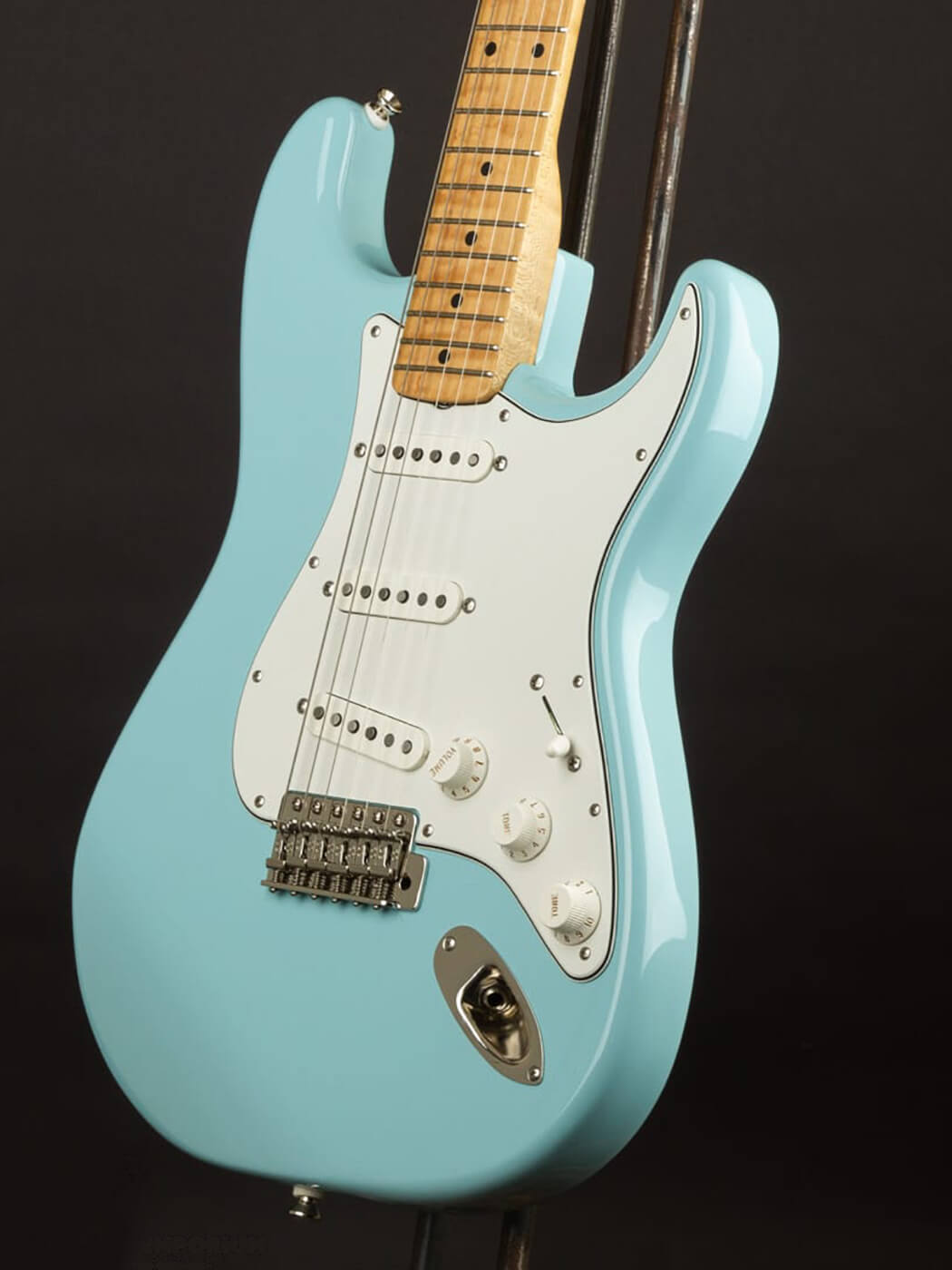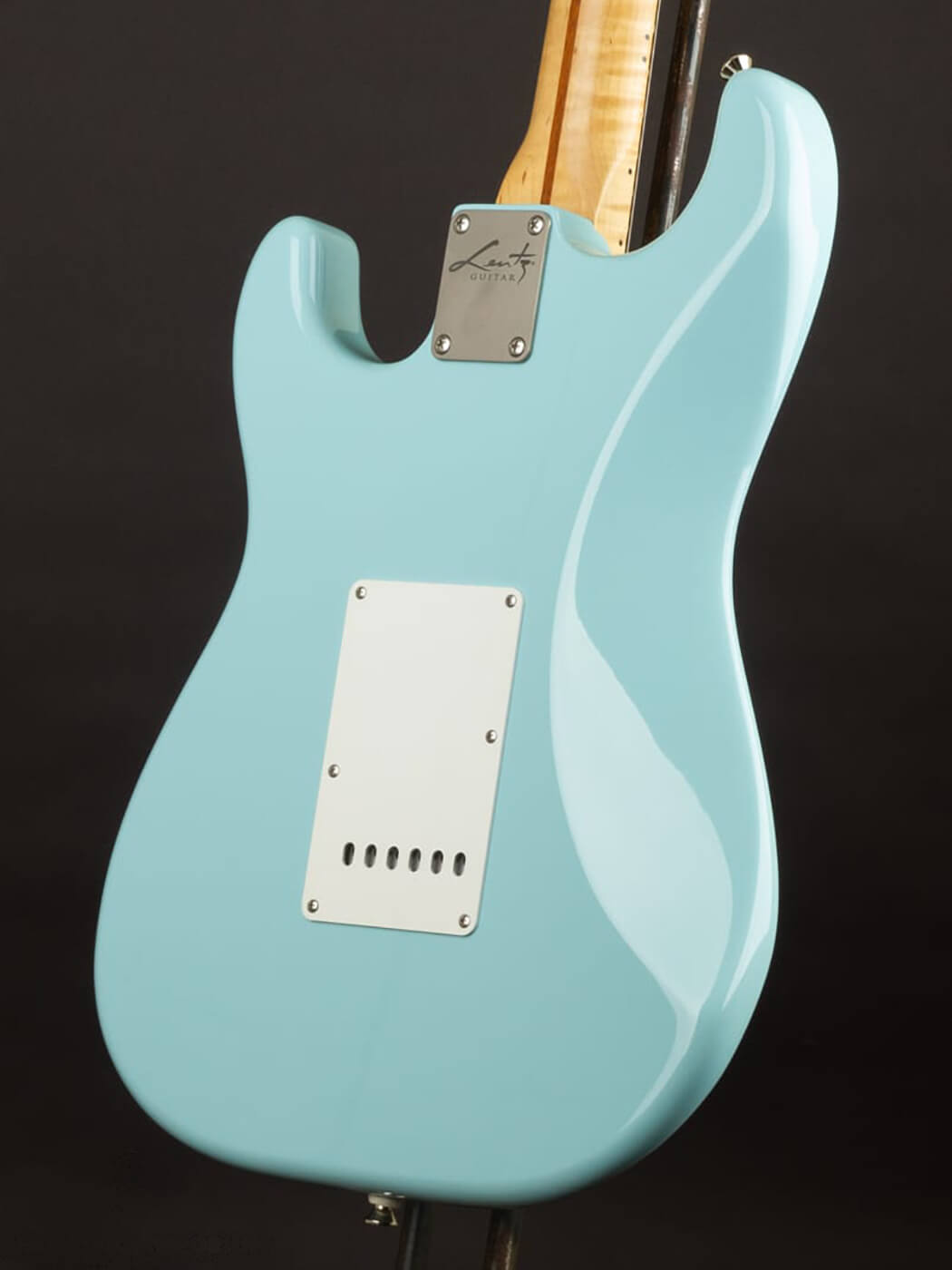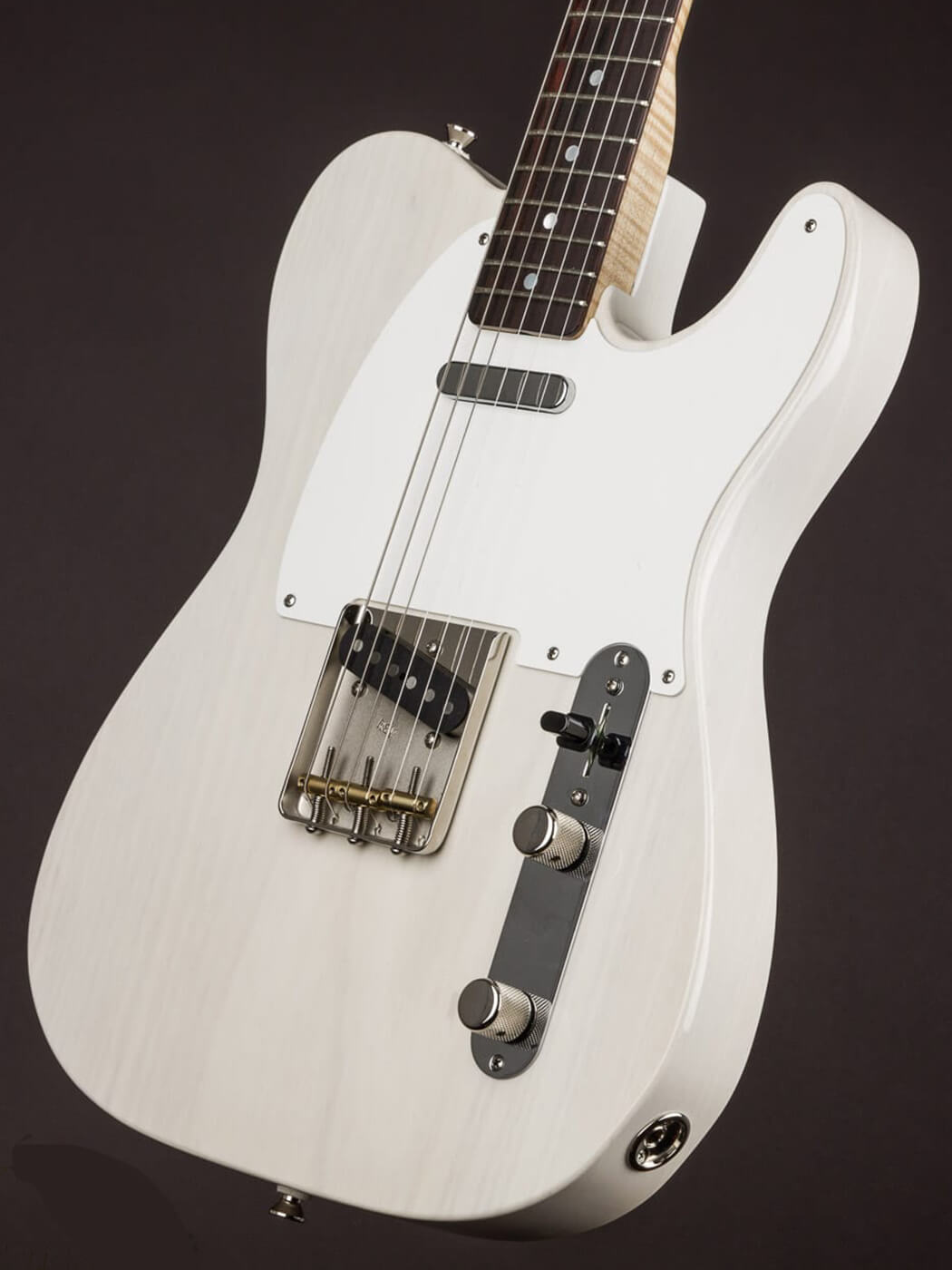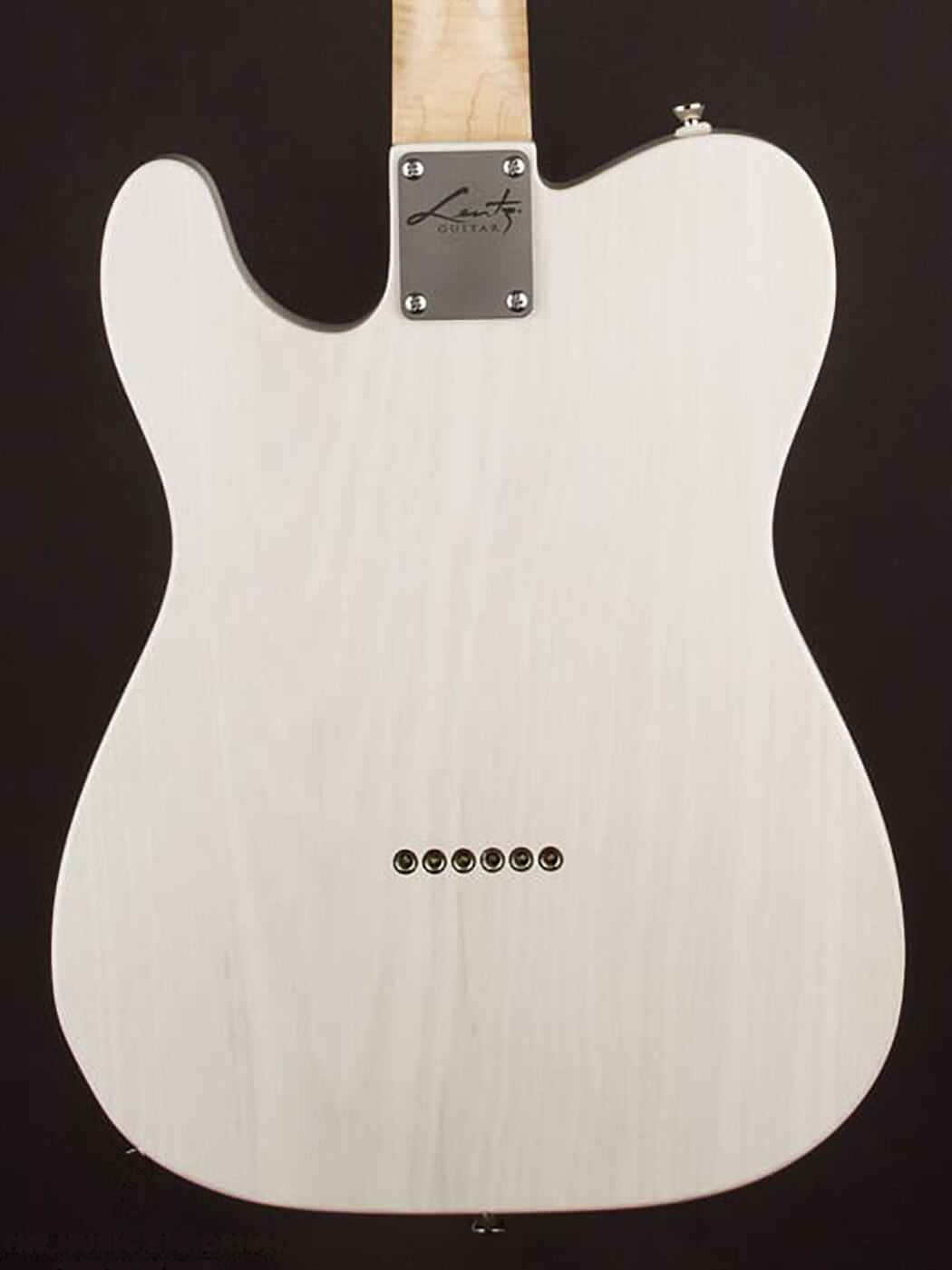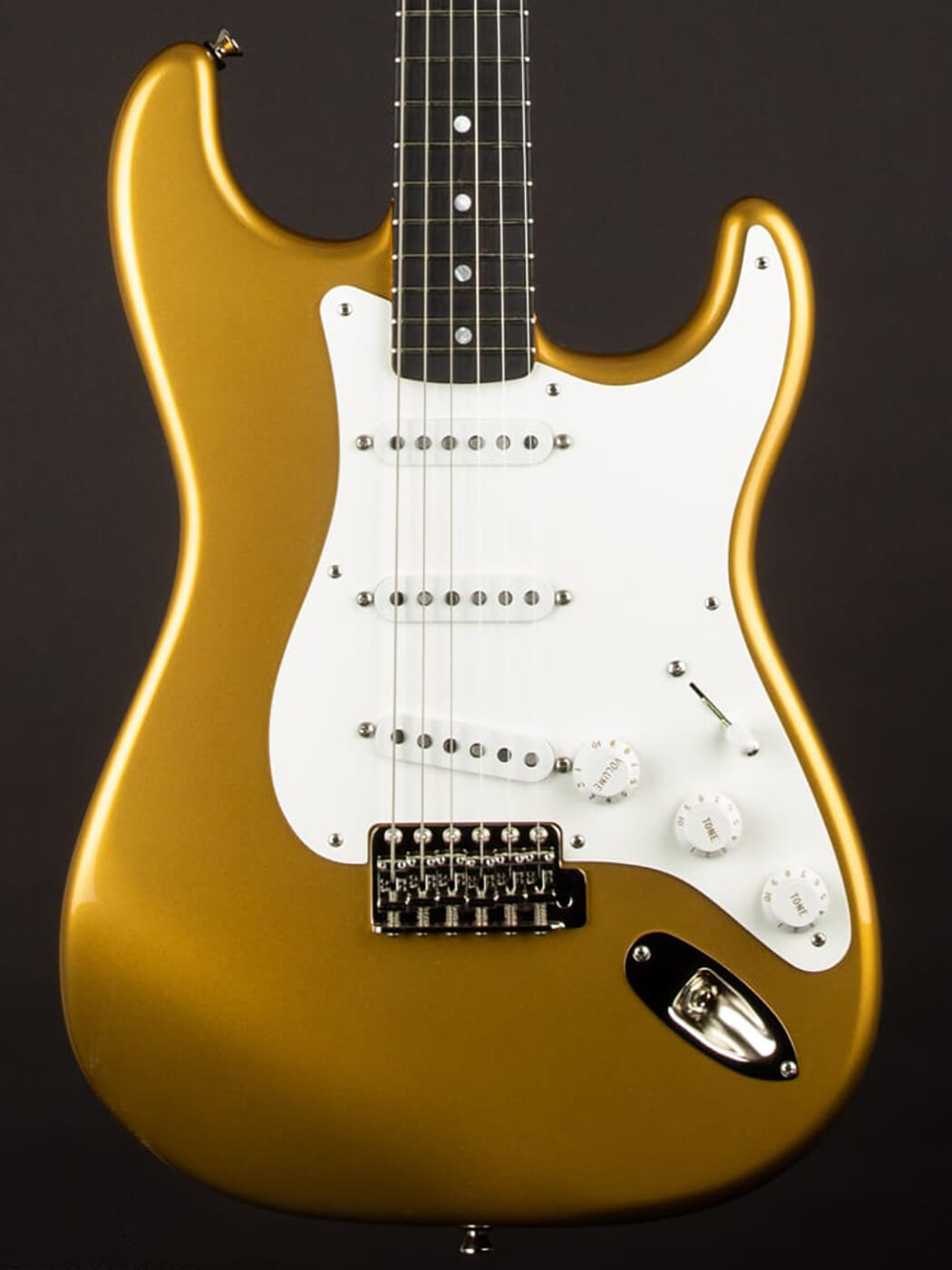Related Tags
The father-and-son team behind Lentz Guitar on creating boutique magic
The archetypal F-style guitar would seem a tapped-out vein by now, yet Scott Lentz Sr. and Jr. consistently inject the magic that keeps players coming back for more.
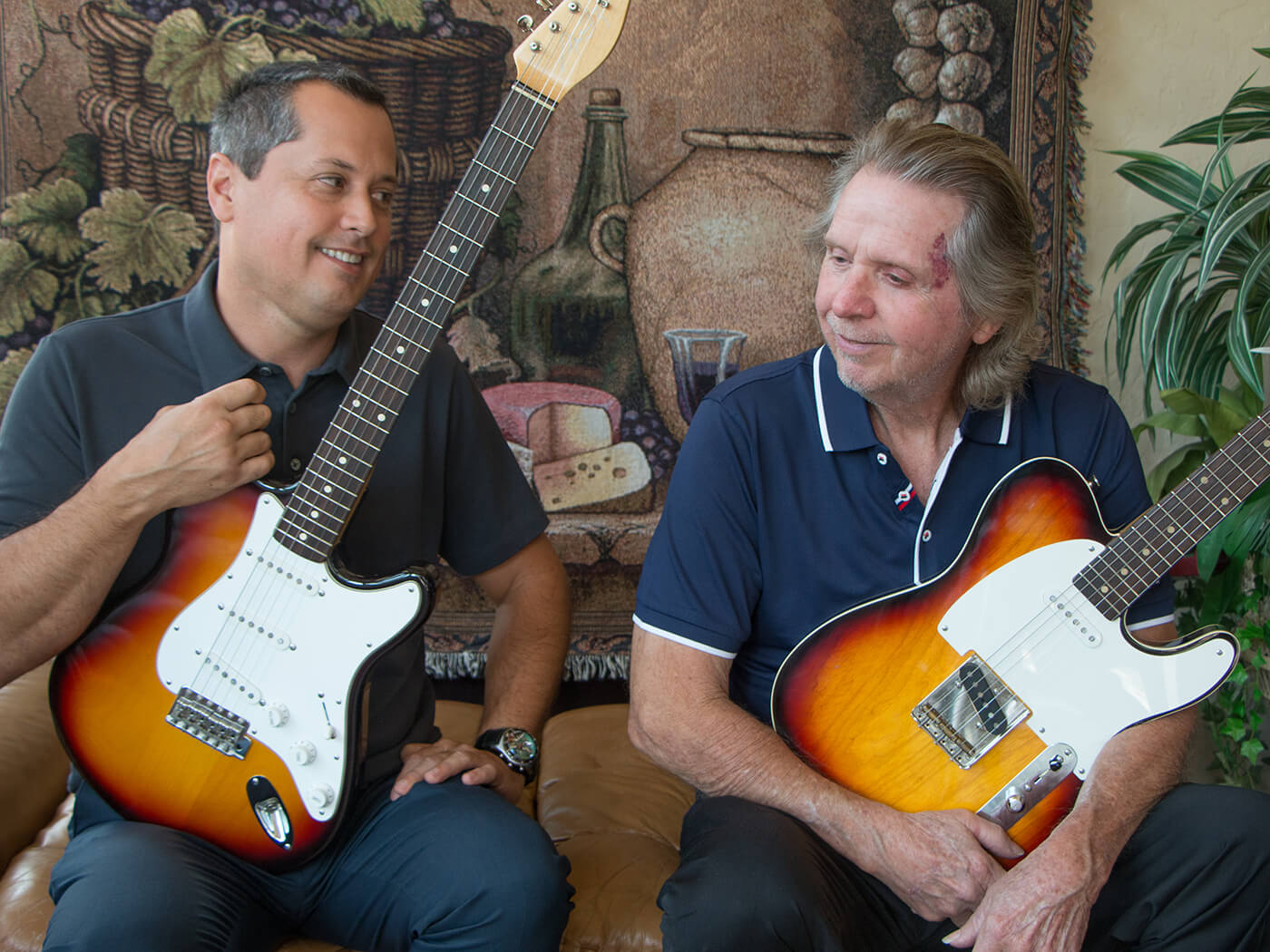
Scott Lentz Jr. and Scott Lentz Sr. with two of their quality hand-finished creations
Ask boutique-minded guitarists for recommendations on a superior bolt-neck, single-coil, single- or double-cutaway electric and the fervent cry “you need a Lentz!” will come back time and again. While the uninitiated might see few significant variables in the construction of archetypal slab-bodied instruments with 25.5-inch-scale necks attached by four wood screws, aficionados of the breed understand that myriad nuances in their construction come together to produce a professional instrument, and to justify the difference between a price tag of £400 and one of £4,000.
The builders at California-based Lentz Guitar understand those nuances like few makers working today, and their mastery of them has delivered instruments that perform at the top of their capabilities, landing them in the hands of a long list of discerning pros, from Buddy Whittington to Phil X, to loads of hard-working studio and touring artists.
With some 40 years of building experience from Scott Sr., the last 20 years of which have been shared alongside his song Scott Jr., there’s a wealth of skill and knowledge to be tapped here, so let’s dig in and see what makes a Lentz stand out from the crowd.
Finished product
In addition to the acclaim for the full-build instruments, Scott Sr. has long been known as one of the best finishing (and refinishing) artists in the business, and early in his career was authorised by CBS to work on Fender guitars. It’s worth noting, too, that all completed Lentz guitars are still finished in-house by Scott Sr. himself.
“Before I started making guitars, I had been doing finishing work on them,” he tells us. “I can remember when I was around 20 years old, someone asked if I could fix an old Framus jazz guitar that had a cracked side from being dropped. I went to my grandfather’s shop, put some glue in the crack and clamped it up. After everything dried, I redid the finish where the crack was. If you didn’t look really close, you couldn’t even tell it was broken.”
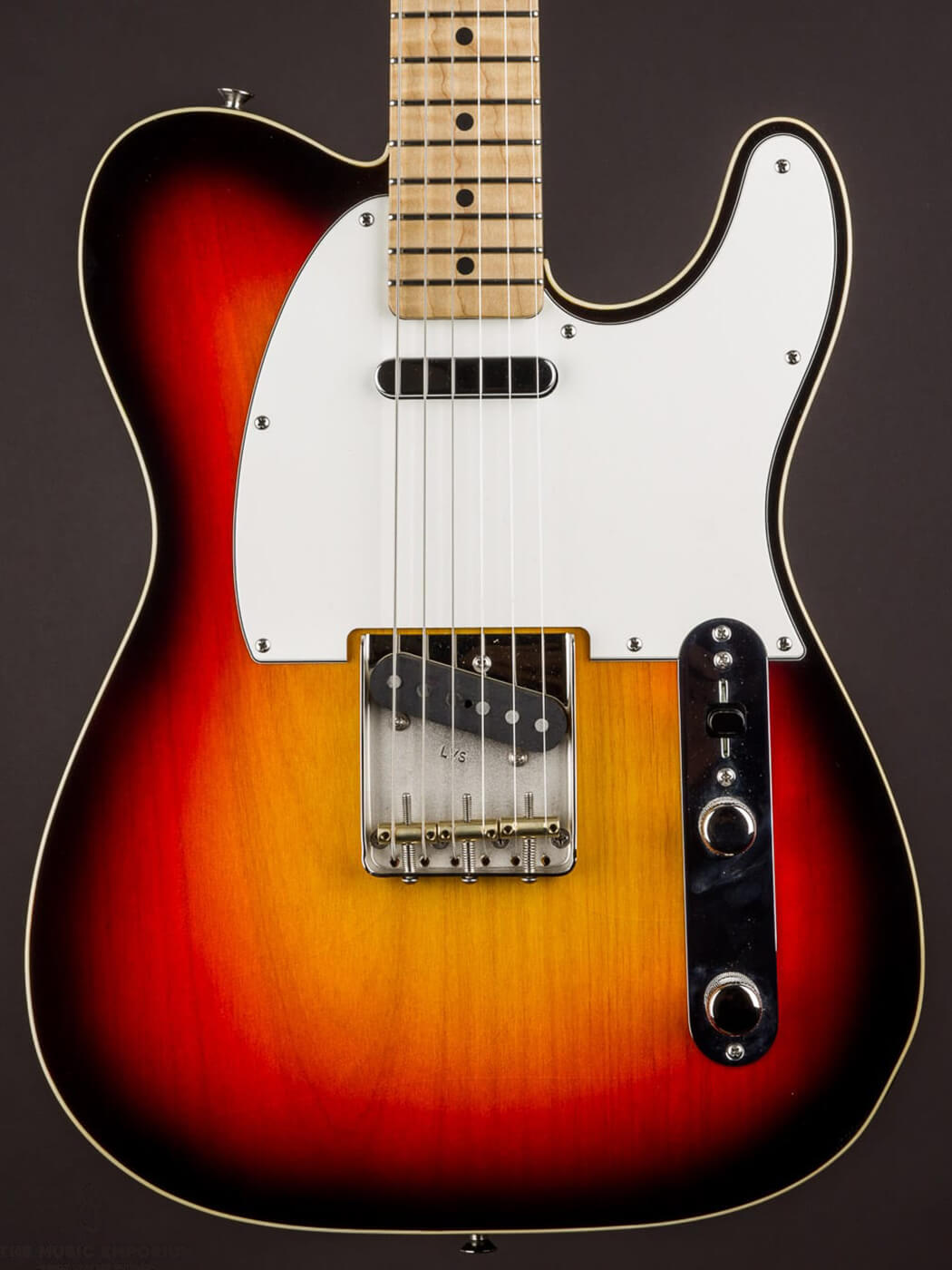
Self-described as “a big woodshop guy in school”, Scott Sr. acquired many of the skills required for top-notch luthiery in what we might call the good old-fashioned way: by learning the craft through the working of the raw materials, before ever applying it to an instrument. Backed by a grandfather who also understood the trade and who had a workshop loaded with all the tools necessary to get the job done, he was off to a flying start when the building bug bit.
“I built my first guitar in 1980, in Encinitas, California,” he recalls. “It was a Strat-type guitar. The body of that first guitar was made from three pieces of alder that I bought at a local lumberyard. I used a bandsaw to cut the shape and routed the body and neck pocket with a template I made. I found a 70s Fender Strat neck for the guitar and screwed on a tremolo. I customised the headstock – I cut it to a shape that I liked – and painted the body blue. One of my customers still has that guitar. I sold it to him for a couple hundred bucks long ago.
“I thought that maybe I could make some money building guitars – I was already refinishing them by then – so I started making more guitars. One thing led to another, and Lentz Guitars is the result.”
Good fortune
In the early 80s, just as he was getting off the ground, Scott Sr. met an experienced guitar-maker in Orange County named Dale Fortune, who had worked for Rickenbacker from the early to mid 70s, had known Leo Fender, and had been an authorised Fender repairman for many years. “I spent a lot of time with Dale at his shop,” he says, “and I learned some really valuable lessons about guitar-building from him.
“I also learned a lot from a local classical-guitar builder, Jose Oribe. He talked about sound in a way that I could relate to and he introduced me to classical-guitar building techniques like using hot hide glue, and much more.
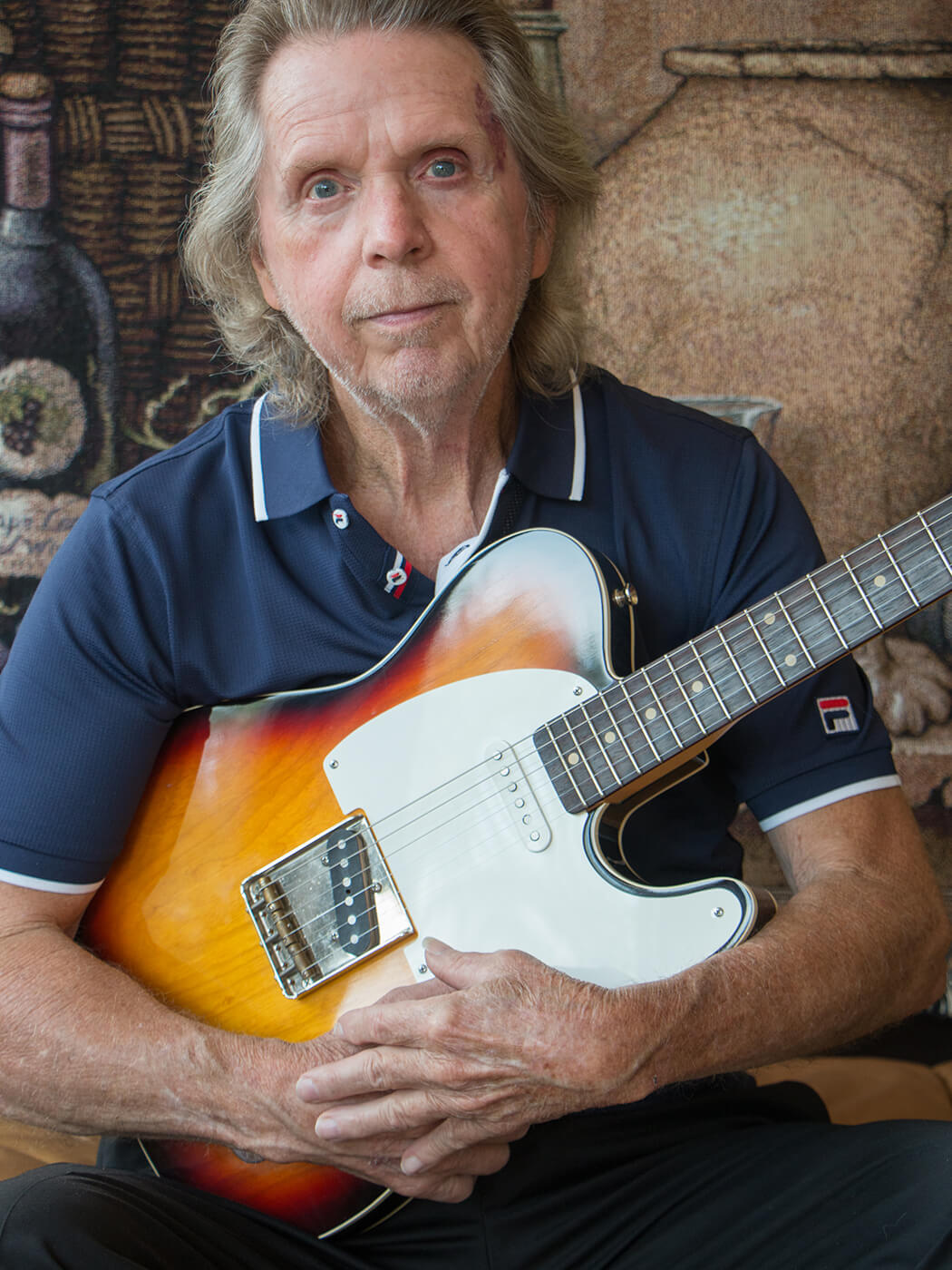
“He told me to learn as much as I possibly could about what I was doing – to take it apart like a scientist and understand every part of the guitar that I was building. Doing that would make my work easier and more enjoyable. When he said that, a light went off in my head. He was 100 per cent right. He’s a remarkable guy who still builds remarkable guitars.”
Even with Fortune on your side, however, the luthier’s lot is not a lucrative one and the location forced upon the Lentz family by a tight overheads found the guitar-maker’s son learning the ways of the street from an early age.
“I grew up in a very tough neighborhood in Southern California,” Scott Jr. tells us, “one that was rife with drug dealers and gangs. Luckily, I was afforded two vehicles for transportation out of ‘the life’: science fiction and luthiery.
“As I got a bit older, I realised that all the great sci-fi ideas would take many generations to come to fruition – certainly beyond my lifetime. So, I chose the more productive route, one that I could pursue in my lifetime: Lentz Guitars. Being productive and creating things that will outlast me have always been, and always will be, important cornerstones in my life.”
If other teenagers might have rebelled against stepping into the family business, few such endeavours are likely as cool in the first place as building world-class electric guitars. Given that, and a free apprenticeship at the right hand of his own father, Scott Jr. says he never longed for any other way of life.
Electronic OCD
None of which is to say it wasn’t challenging getting up to speed in an organisation with such high demands and tight tolerances. When high-end guitars are the aim, near-perfection is the name of the game – and if Scott Jr. couldn’t nail it right out of the gates, well, he knew which way the door was.
“I’ve held Scott – my dad – in high regard for a long time,” says Scott Jr. “The skillset he possesses is formidable… and not just with guitars! And he set the bar high for me. You get one chance at Lentz to make good things happen.
“I remember early on being shown how to do a particular job – let’s say sanding a guitar body. Scott would show me how to do the job one time – I got just one try to get it right. If I couldn’t perform the task, the job would be taken away from me, never to return and that was that! I knew early on that I needed to cut my own path to make it work. And I did just that.”
Along with taking on everything needed to build a first-class guitar start to finish, Scott Jr. took naturally to the internals that make an electric guitar electric. “That was the one thing that I had a natural talent for from the start. All Lentz guitars are wired in house, by me personally and I still really enjoy that particular part of guitar-making. It caters to my OCD side for sure.”
Dropping the F-bombs
Having posited at the top of this feature the notion that some guitarists might view the whole F-style homage as being fairly played-out by now, it’s interesting to probe Scott Sr. on what took him down this road in the first place.
“I’ve had a love-hate relationship with Fender Strats for years,” he reveals. “I love them when they work right and I hate them when they don’t. I think I decided to initially focus on the F-style guitars because I was confident I could build them – I knew I had the woodworking skills I needed to do it.
“Initially, I built the bodies, and I would send the neck and fingerboard wood up to Santa Barbara to a guy who would use that to build the necks, then send them back to me. After a while, I started building my own necks, too. Over the years, I’ve built all sorts of guitars that don’t fit the mould of the F-style bolt-on neck instruments, including set-neck and through-body necks.”
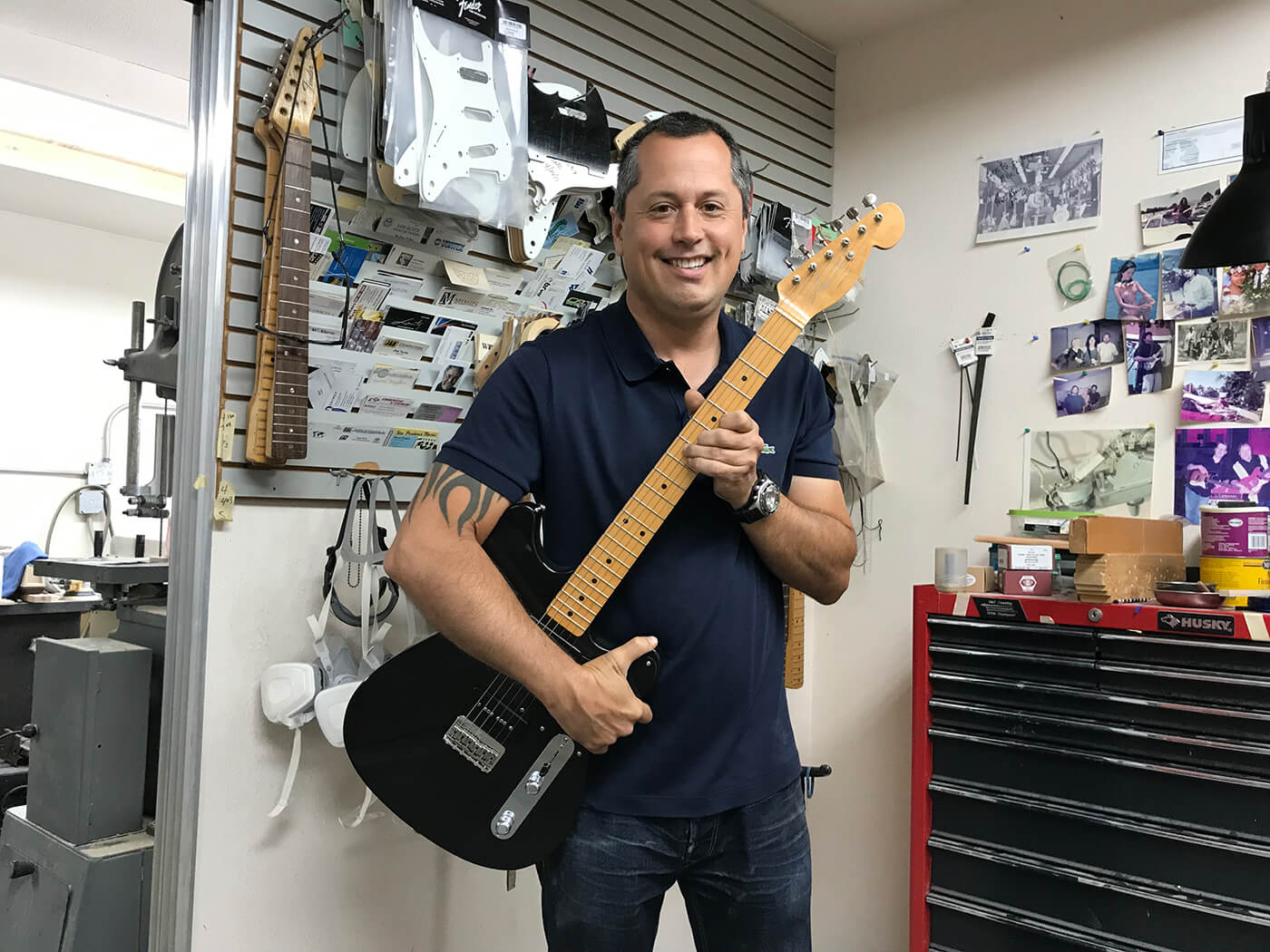
In the latter categories, Lentz’s Croydon model is beloved by many guitarists for its marriage of the Lentz-modified offset double-cutaway body shape with flame-maple/mahogany construction, a glued-in neck and dual humbuckers, to achieve a very Les Paul-leaning performance. Further proving there’s plenty of originality in the pudding, the DL-90 and HSL adapt the bolt-neck concept to an original body style with dual P-90s on the former, and one Tele bridge plate and pickup and one neck-position P-90 on the latter.
Private reserve
Right from the outset of the venture, Scott Sr. made a point of seeking out and acquiring the best wood he could lay his hands on and over the years, he and Scott Jr. got in the habit of saving up some of the ‘best of the best’ for particularly special projects. Eventually, the Lentz wood stores were replete with beautifully aged, decades-old tonewood just waiting to be crafted into elite musical instruments.
“We had a lot of old wood in storage that we had purchased through the years,” says Scott Jr., “some really special boards. One day, Scott and I decided that we needed to take this great, old wood and make it into guitars. We wanted to get it out of storage and into the hands of players who would enjoy and appreciate it.
“The Lentz Reserve guitars were born. We decided from the start that these guitars would be the best of the best – exceptional instruments that amaze their owners. In these Reserve builds, we combine the best woods, craftsmanship and parts available to date. Throw in that signature Lentz tone and you have one inspirational, outstanding, lifetime guitar.”
Although the Lentz Reserve guitars are split into Jr. Reserve and Sr. Reserve instruments, the sub-categories don’t indicate any sort of lesser-to-greater dichotomy; instead, they merely delineate guitars made from this prized timber supply by Scott Jr. or Scott Sr., respectively.
It’s worth adding here, too, that while every one of the several Lentz guitars I’ve had the pleasure of checking out over the years has been an outstanding instrument, one Jr. Reserve S that I tested three years ago easily ranked among the finest Strat-style guitars I’ve ever played.
Crafting magic
Beyond the quality of the raw materials, though, the end results that Lentz Jr. and Sr. achieve owe just as much to their practice of listening to the customer’s needs and honing the specs and expectations until builder and client both fully understand what they’re aiming at.
“We always try our best to accommodate our clients’ vision in the best way possible,” Scott Jr. tells us. “I’m a guitarist, too, so I know what it’s like to want my dream guitar. I always strive to make the best guitar possible with the client’s needs in mind.

“We start by taking the time to explain our product in detail,” he adds. “Going over all the options available to them. If our opinions differ, we let the client know just how we came to our opinion about a particular topic. Scott has been building guitars for almost 40 years and finishing them for even longer. We’ve got a lot of experience to draw from. We have found that a well-informed customer equals a happy customer.”
Asked what he’s learned of the ever-fickle guitar business these past 30 years, Scott Sr. presents us with a slice of cold reality that confronts many small-shop builders:
“The only thing I learned early on was that you couldn’t make a living making guitars without the internet – I made more money refinishing guitars. In fact, I quit building guitars for a while to focus on the refinishing business.
“Once the internet started taking off, I got back into building guitars again and was able to make money doing it. It was then that I started playing with how different combinations of wood and electronics affected the final result. When you get it right, it’s magic. My son and I put a lot of effort into getting it right.”
“It’s been our great privilege to serve the guitar playing community for these many years,” adds Scott Jr. “We’d both like to extend a big thank you to all the Lentz Guitar customers – past, present, and future.”
Visit lentzguitar.com for more information.

